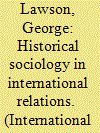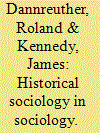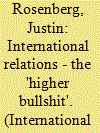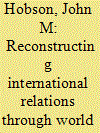|
|
|
Sort Order |
|
|
|
Items / Page
|
|
|
|
|
|
|
| Srl | Item |
| 1 |
ID:
077892


|
|
|
|
|
| Publication |
2007.
|
| Summary/Abstract |
Over the last 20 years, historical sociology has become an increasingly conspicuous part of the broader field of International Relations (IR) theory, with advocates making a series of interventions in subjects as diverse as the origins and varieties of international systems over time and place, to work on the co-constitutive relationship between the international realm and state-society relations in the processes of radical change. However, even as historical sociology in IR (HSIR) has produced substantial gains, so there has also been a concomitant watering down of the underlying approach itself. As a result, it is no longer clear what exactly HSIR entails: should it be seen as operating within the existing pool of available theories or as an attempt to reconvene the discipline on new foundations? This article sets out an identifiable set of assumptions and precepts for HSIR based on deep ontological realism, epistemological relationism, a methodological free range, and an overt normative engagement with the events and processes that make up contemporary world politics. As such, HSIR can be seen as operating as an open society, a research programme and a vocation
|
|
|
|
|
|
|
|
|
|
|
|
|
|
|
|
| 2 |
ID:
077893


|
|
|
|
|
| Publication |
2007.
|
| Summary/Abstract |
While historical sociology (HS) has declined in the UK, its position in the United States is much more secure. This article analyses the divergent paths of HS in both the UK and the US in order to provide some lessons for international relations (IR) in both countries. The article argues that HS in the US has been more successful in defining its particular contribution - the pursuit of important, macro-oriented research. The main benefit that HS can bring to IR is the provision of this 'intellectual space' allied to an engagement with 'big issues'. The article traces such a contribution in three areas: the state, civil society and democratization; nationalism and ethnic conflict; and Islam and the Middle East. The article concludes by arguing that the adoption of HS may have the added benefit of transcending the exigencies of the present-day and the parochialism of Western and Eurocentric concerns found in much contemporary IR
|
|
|
|
|
|
|
|
|
|
|
|
|
|
|
|
| 3 |
ID:
077897


|
|
|
|
|
| Publication |
2007.
|
| Summary/Abstract |
This article replies to an earlier forum (International Politics (42.3) on 'Globalization Theory: a Post Mortem'. Whereas the 'Post Mortem' had criticized Globalization Theory largely for its neglect of Classical Social Theory's achievements, the current paper emphasizes its reproduction of one of Classical Social Theory's greatest limitations: the failure to incorporate 'the international' into its theorization of historical development. This limitation, it is argued, may be overcome using the idea of 'uneven and combined development', an idea which is first reformulated (in order to re-connect the premises of social and international theory), and then used as a vantage point from which to respond to criticisms of the 'Post Mortem'. 'The international', it turns out, is not the fading reality postulated by Globalization Theory but rather a fundamental dimension of social existence that IR, uniquely among the social sciences, encounters as its core subject matter
|
|
|
|
|
|
|
|
|
|
|
|
|
|
|
|
| 4 |
ID:
077896


|
|
|
|
|
| Publication |
2007.
|
| Summary/Abstract |
The historical sociology of international relations is becoming an increasingly prominent field of enquiry. While advocates of an international historical sociology (IHS) have delivered a range of outstanding contributions, they have tended to revolve around the macro-scale, dealing with sweeping grand themes such as the nature of civilizations, the creation of world order, the advent of modernity, and the purpose and formation of the state. This article makes the case for incorporating micro-historical sociological analysis into IHS as a means of complementing already existing analyses, and providing a more rounded field of enquiry. The article argues that the micro-macro issue is an analytic strategy rather than an ontological choice, illustrating this point through a historical institutionalist variant of foreign policy analysis
|
|
|
|
|
|
|
|
|
|
|
|
|
|
|
|
| 5 |
ID:
077895


|
|
|
|
|
| Publication |
2007.
|
| Summary/Abstract |
In this article, I seek to move the agenda for historical sociology of international relations (HSIR) onto the next stage of research by considering how both international relations (IR) and HSIR can benefit from entering into a dialogue with World History and, more specifically, with what I call the 'new global history'. This is necessary because much of IR - and ironically, the vast majority of HSIR - suffers from ahistorical Eurocentrism. In this article, I begin the process of reconstructing IR by drawing on a range of non-Eurocentric arguments that are furnished in the new global history. My overarching framework explores how 'Eastern agency' and 'Oriental globalization' have informed many of the developments in world politics that are conventionally assumed to have Western origins. More specifically, I show how various global-dialogic relationships conducted between Eastern and Western agents have shaped the modern world, in particular capitalist modernity and the rise and spread of the sovereign state. In the final part of the article, I argue that great power politics under Oriental globalization differed fundamentally from Western hegemony/imperialism, thereby debunking the myth that great power politics can be universalized through time and place. In the conclusion, I suggest various areas of future research that could propel both IR and HSIR out of their ahistorical Eurocentric impasse.
|
|
|
|
|
|
|
|
|
|
|
|
|
|
|
|
| 6 |
ID:
077894


|
|
|
|
|
| Publication |
2007.
|
| Summary/Abstract |
Much of the literature in political economy seeks to capture an essential insight into the evolution of political and economic systems to provide a foundation for policy advice. This article suggests that attempts to nut out the kernels of change often restrict rather than expand policy imagination. Three 'fevers' are identified as involved in the narrowing of policy imagination and two 'tonics' are offered to widen it. The three fevers are: (1) viewing the present as natural; (2) seeing history as overtly path dependent; and (3) viewing history as driven by 'Great Men'. These fevers limit our capacity to see political, social, and economic changes that do not conform to conventional theories, as well as distorting our understanding of how the contemporary world works. What policymakers want, more than prediction or recitation of conventional theories, is context to understand how policy can be implemented. Historical sociology provides a way to generate information about the complexities that make events unique, as 'contextual constellations', through two 'tonics': intentional rationality and social mechanisms. With the assistance of these tonics, historical sociology widens political economy's policy imagination
|
|
|
|
|
|
|
|
|
|
|
|
|
|
|
|
|
|
|
|
|